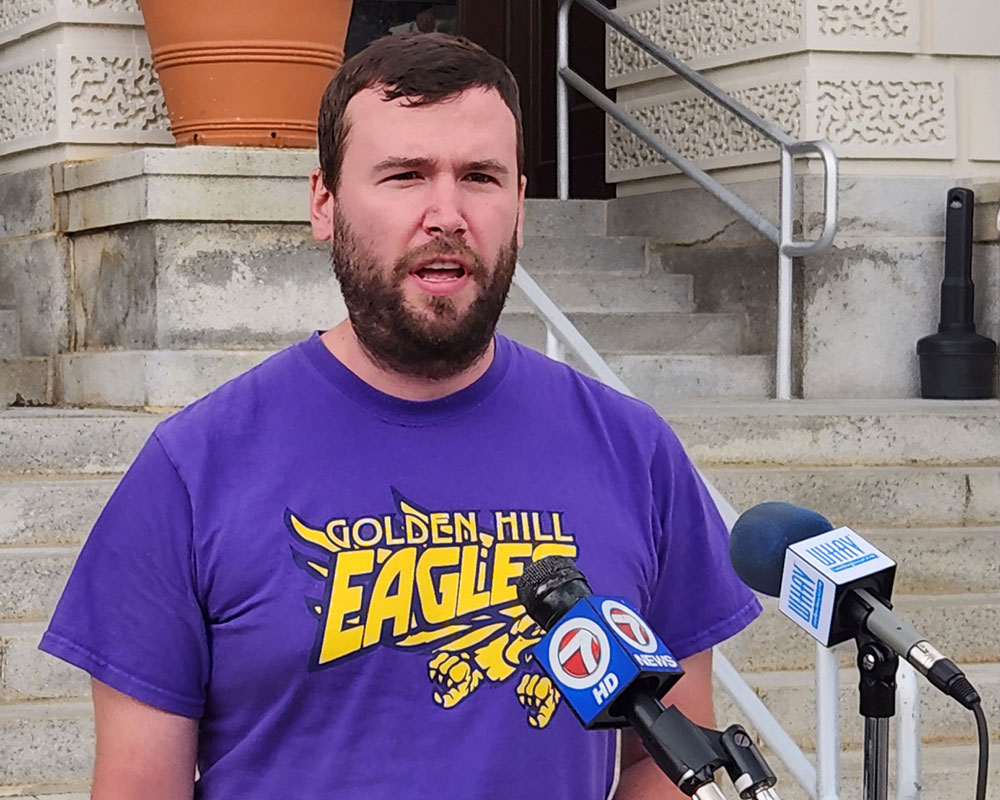Members of the Haverhill School Committee arguably violated state law Thursday night in their zeal to score an election advance by voting to end legal action against the Haverhill teachers’ union. They also appeared to have strategically leaked the decision to the union.
School Committee members Scott W. Wood Jr. and Toni Sapienza-Donais rejected an effort to wait three weeks and led the pre-election effort to drop the action filed in wake of the union’s strike last fall. The fast-track timing—which excluded outside city lawyers—suggests, what’s known in political circles as, an “October surprise,” despite the actual month. The city alleges a $200,000 payment made by the union after the strike—deemed illegal under state law—did not cover the actual costs of extending the school year and paying non-teacher staff for additional days of work. Officials have previously estimated totals of at least $600,000.
Haverhill Education Association President Barry Davis singled out Wood and Sapienza-Donais in a press release for leading the effort that resulted in a nuanced 5-1 vote to end litigation. The duo also recently joined forces to support higher raises for the union’s educational support professional’s unit.
Haverhill School Committee member Paul A. Magliochetti said Sunday, in hindsight, the executive session request was likely illegal and the resulting vote and leaks to the union appear to have been fixed.
“Based on calls that some School Committee members received prior to the (Aug. 24) school Committee meeting, there may have been discussions between some members of the School Committee and members of the HEA that predetermined votes on the decision to drop all litigation against the HEA. If this occurred and results in HEA support for candidates that the HEA communicated with, then there may be an ethical violation that needs to be addressed,” he said in a statement.
The news was first revealed late Thursday night by the Haverhill Education Association, even though the School Committee could not legally release the decision since it failed to “state the purpose for the executive session, stating all subjects that may be revealed,” according to state law. The union had a graphic, with photographs of all School Committee members, ready to go on social media after the meeting at 9:42 p.m., according to a timestamp.
Wood appears in two places on Sept. 12 election ballots. He is seeking one of two slots in a five-way for mayor as well as a slot for Ward 4 School Committee, where he faces three other contenders. Donais, who is on final elections ballots for both City Council and School Committee in Ward 2, gave a spirited defense of Wood in June. She helped block an effort by three colleagues to officially request copies of background investigations of Wood by Haverhill Deputy Police Chief Donald Thompson in 2013, Detective Richard Welch in 2020 and Capt. Meaghan Paré in 2022.
Davis supported an investigation of Wood during a speech he gave in June on the steps of City Hall. “The kids of Haverhill, the citizens of Haverhill, deserve a transparent city. They deserve a city that works for them,” he said.
The union said the lone vote against ending legal action came from School Committee member Richard J. Rosa.
Rosa told WHAV only that he proposed delaying the vote until the Sept. 14, School Committee meeting “so we could receive detailed explanations, clarity and advice about the various litigation matters from our lawyer regarding any potential consequences of our actions. Two of my colleagues agreed, but the motion failed in a 3-3 vote.”
“An executive session is for discussing litigation, collective bargaining and other narrowly defined exceptions to the open meeting law as allowed by Massachusetts General Law chapter 30A, section 21. I believe I would be violating the spirit of the law if I discussed what my colleagues said about litigation at our last executive session or previous executive sessions relating to the same topic, especially since the litigation is still pending,” Rosa said in a statement. He added he “also had concerns about making a significant financial decision in a secret meeting given the vagueness of the agenda item.”
The news was first revealed late Thursday night by the Haverhill Education Association, even though the School Committee could not legally release the decision since it failed to “state the purpose for the executive session, stating all subjects that may be revealed,” according to state law. Further, the Committee stated on its own agenda that it would “not reconvene in open session.” State guidance notes, in similar situations a public body “should promptly disclose the agreement in open session.”
School Committee lawyer David M. Connelly told WHAV Friday he had no knowledge of the Committee’s action.
Left unanswered by the Committee vote is the impact on Superior Court action by the Commonwealth Employment Relations Board against the Haverhill Education Association for the strike.
Davis said the city’s legal action is contrary to the agreement that ended the teachers’ strike.
“When we settled the strike last year, we thought we could finally move on and focus solely on supporting our students. Yet, some members of this School Committee and the board’s attorney clearly had a different agenda,” he said. “They wanted to punish us for doing what we had to do to win a fair contract, and their lawyer is trying to make a name for himself as a union buster.”
Davis added the union is withdrawing its unfair labor practice charge it filed with the state Department of Labor Relations in response to the School Committee’s attempt to penalize the union.
“Since they are dropping their lawsuits, we are happy to drop ours,” Davis said. “Now is the time for the union and School Committee to move forward and address the urgent need to pay our education support professionals a living wage.”
